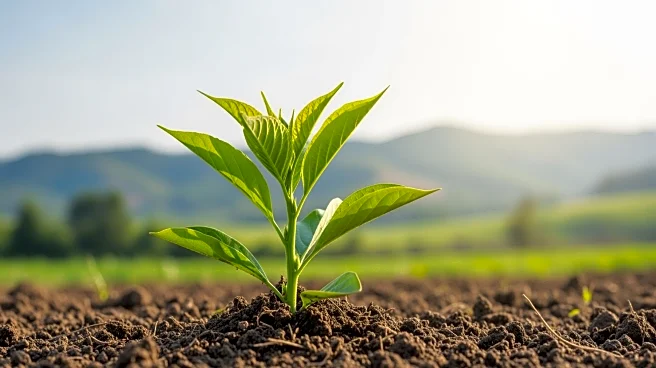What's Happening?
The Brazil Sustainable Farming Market is anticipated to grow significantly, reaching $89,392.3 million by 2032, according to recent projections. This growth is driven by increasing government support for eco-friendly agriculture, rising demand for organic
food, and the adoption of advanced farming technologies. The market, which was valued at $41,340.0 million in 2024, is expected to expand at a compound annual growth rate (CAGR) of 10.12% from 2025 to 2032. Sustainable farming practices in Brazil focus on enhancing productivity while conserving natural resources and promoting environmental, social, and economic sustainability. Techniques such as crop rotation, organic farming, precision agriculture, and water-efficient irrigation are employed to reduce carbon emissions, improve soil health, and ensure long-term food security and rural development.
Why It's Important?
The expansion of the Brazil Sustainable Farming Market is significant for several reasons. It reflects a global trend towards sustainable agricultural practices that prioritize environmental conservation and food security. As consumer demand for organic and sustainably produced food increases, the market's growth could lead to broader adoption of eco-friendly farming techniques. This shift is likely to benefit the food and beverage industry, biofuel industry, and animal feed industry, among others. Additionally, government incentives and regulatory frameworks promoting sustainable agriculture could further drive market growth, potentially influencing similar practices in other countries. The adoption of precision agriculture technologies and data-driven farming techniques could optimize resource use, enhance yields, and minimize environmental impact, contributing to a more sustainable global food system.
What's Next?
The Brazil Sustainable Farming Market is poised for continued growth, with several key developments on the horizon. The integration of advanced technologies such as AI and big data analytics, drones, and satellite imaging is expected to further enhance farming efficiency and sustainability. As the market expands, major players like BASF, Amaggi Group, and Bunge are likely to increase their investments in sustainable farming practices and technologies. Additionally, the market's growth could lead to increased collaboration between industry stakeholders and government agencies to promote sustainable agriculture. This collaboration may result in new policies and incentives that support eco-friendly farming practices, potentially influencing global agricultural trends.
Beyond the Headlines
The growth of the Brazil Sustainable Farming Market could have deeper implications for global agricultural practices and environmental conservation. As Brazil adopts more sustainable farming techniques, it may serve as a model for other countries seeking to balance agricultural productivity with environmental sustainability. The market's expansion could also lead to increased research and development in sustainable agriculture, driving innovation in farming technologies and practices. Furthermore, the focus on sustainability may encourage greater collaboration between industry stakeholders, government agencies, and civil society groups to address global challenges such as climate change, food security, and rural development.
















